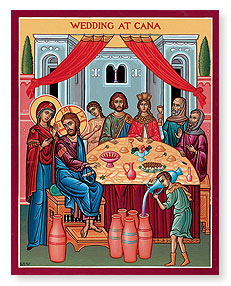I have been quite critical recently of the efforts by some segments within the church to pass MN’s marriage amendment, and of the entire “culture wars” approach to engaging and forming culture in general. Since my concern over these efforts revolves around the use of political tactics that tend to foster alienation and resentment rather than unity and charity, I thought I would offer a few thoughts on where I see space for positive, common ground for Christians on this issue.
Two personal stories to illustrate my point: My wife and I very much believe our marriage to be a sacrament, a tangible sign of God’s grace in our lives. As such, we moved through the marriage preparation process through our parish at that time (which is not here in the St. Paul-Minneapolis Archdiocese), and were married at that same parish. Part of our marriage prep involved taking the PREPARE inventory, attending a weekend long retreat (both of which we found very enriching), and attending a mandatory presentation intended to inform us about the canonical rules regarding marriage in the Roman Catholic Church. We were happy to engage in each of these activities.
The informational presentation, put on by the office for Family Life of that particular diocese, involved approximately an hour of a very well-intentioned couple speaking to us about how the only way to truly have Jesus and the Holy Spirit in our marriage is to follow the church’s teaching on contraception. Now I respect the right of the diocese and local magisterium to teach as they sees fit. At the same time, I found myself asking “what was missing from this presentation?” Having attended a Catholic university, I can speak from experience that the vast majority of my friends no longer place much importance upon practicing their faith within the church, as they see it as mostly irrelevant for their daily lives. But when big life-events arise – such as marriage, birth and baptism, death – I find that “cultural Catholicism” begins to pull at their heartstrings and they briefly turn to the church, even if only for the ritual marking of such important events.
What this suggests to me is that these kind of events – marriage and baptism preparation in particular – are some of the most significant opportunities for (re)evangelizing the faithful. And yet, here we were in a room full of young couples asking to be married in the church and we were told that the most important aspect of this sacrament was contraception. This was a missed opportunity to speak to us about the beautiful sacramental theology of the church, to invite us as couples to live the mystery of the sacraments on our journey through life, and to see how our lives could be enriched by engaging more deeply in the sacramental life and community in which we had already asked to be married.
A second story: When my wife and I began to experience struggles in communication a few years into our marriage, we decided to look for outside help. We did go and speak with the priest who married us (who was not the pastor of our church, but a member of a nearby religious community). We did not, however, even consider going to anyone in our parish for help. Why? Because there was none offered (at least that we knew of). There were marriage prep retreats and marriage renewal retreats (both of which are wonderful things), but there was nothing offered to reach out to struggling couples. Studies have shown that couples considering divorce who seek help (usually therapy), are significantly more like to stick together and this has certainly been true in our case as our marriage is stronger than either of us could have imagined.
Having been married less than five years, here are two missed pastoral opportunities for us to feel even more supported in trying to live out a sacramental marriage in the life of the church. But, what, you may be asking yourself, is my point? My point is this: there are creative and alternative models for supporting marriage, and for finding common ground that avoid Christian engagement in the culture wars, that build up the body of Christ, and that tend to foster less alienation and resentment. It is this kind of constructive building up of culture that will be most effective in evangelizating a new generation of Catholics or Christians. It is also this kind of witness that demonstrates a truly compassionate image of the Kingdom of God that will be most enticing to those who are seeking something more in our culture. I am not claiming that Christians should avoid direct engagement in the civic and legal aspects of culture – indeed, much of my research in my short career has been focused on this topic – but rather that there are other pastoral concerns that should not be overshadowed by the attempt to win the culture wars.





Tom– Thanks for this piece. I would echo and emphasize the overwhelming importance of parish community resources for struggling couples: there is often nowhere good to turn. We make much of how the sacrament of marriage is a communal celebration – not a private one – and yet the reality in many parishes is that there is not an obvious ministry (other than “going to the priest”) for couples who hit struggles. Our tendency to engage in political battles or simply reduce issues like divorce to “personal morality” show how Catholic ecclesiology in practice misses the most important level: that of the Church being the Church!
This is a wonderful post, thank you so much. It is so richly satisfying in the way that the sacrament of marriage is presented, and not just a list of what is canonically correct- or not. Your story about the contraception is an excellent example.
What particularly strikes me is the thought of how so many people would not think of their parish as a resource for help in hard times. As an employee of a parish, I am going to show this share this post at work.
I love what David has added in his comment, that the essential quality of marriage as elemental to community, is never emphasized enough. For whatever it is worth, I feel privilege and the responsibility of being the first voice for so many who call to inquire about marriage. The number of “we want to use your church” calls is daunting, but I always try to be open, welcoming, positive and to make clear that this is about more than “using” the church building. We’re lucky, we have a good pastor that is engaging and not one to dismiss couples who may not yet see it this way.
There is so much more that I could say, but I will close my comment here. Thank you for talking about what is good and right – and not couching it in what is so terribly “wrong” and “immoral.” Thanks for talking about how marriage and families are so important, and for providing the notions of context, catechesis, and commitment in how that happens.
I like your inclusion of personal stories and so I want to briefly include mine. I went through similar marriage prep with my husband (a Protestant to whom all of this was quite unfamiliar). We also had the “talk” on birth control. As a budding moral theologian trained at a great (the best?) Jesuit university, I was very critical of the presentation for some of the same reasons you mention here. Not to mention I had to wonder how my soon-to-be husband would react to all of this distinctly Catholic stuff.
A series of events in my marriage left me wondering “what’s missing here” and I found myself recalling that presentation on the church’s teaching on contraception. I found myself praying a lot about it. And I found myself realizing a fundamental truth behind this teaching. Marriage (forgive me for simplifying and not taking seriously the very good feminist critiques on this point) is about self-sacrificial love. It is about laying down your life before and for your spouse. It is about a vulnerability that inspires the fear we like to call awe. This is what lies behind the sacramentality of marriage and why we see in marriage a parallel for Christ and the Church. Not using artificial contraception is a practice of vulnerability. It is a practice of self-sacrifice, of truly sacrificing one’s will. It is a practice of learning to live mystery. It is a practice of not being in control and learning instead to respond to grace. It is a practice of learning to communicate, of learning to be open, of learning to be honest. And for me especially, it is a practice of coming to revere, even love, my body.
Can you accomplish all of these things while using artificial contraception? Yes, I think you can. And I certainly wouldn’t want a marriage prep retreat to only talk about contraception. But I also wouldn’t want it to fail to talk about the church’s teaching on contraception, and to talk about it joyfully. Our culture has such a totally divergent view of marriage than the church and so I think it is important to catechize, to evangelize, and to hold up these beautiful, if underrated teachings, to people ripe to receive them. It might look like “culture war” to you, and I am sure the birth control talk at my pre-cana retreat fostered alienation and resentment from some. But for me, it was a source of life, a well-spring that I returned to in some of the difficult times in my marriage. I would not want to have missed that moment in preparing for married life.
Thanks, Beth for this beautiful description of how you came to embrace NFP. This is exactly the kind of thing we need. With Tom, I hope for more work to support marriage in parishes and communities. Too many Catholic couples encounter no compelling vision of sex, marriage, and family in their marriage prep or sermons, and few turn to their parish for support in difficult times. Surely, if we care about marriage, we can do better.
Beth, I would have loved to have heard your story at our marriage prep meeting with our parish. There is something about personal stories that makes things a little more “approachable,” especially when dealing with these kinds of difficult topics. Thank also to David, Fran, and Julie for your responses. Fran, I am delighted that those of your “in the trenches” of parish life are reflecting on these pastoral challenges as well. Best of luck to you!